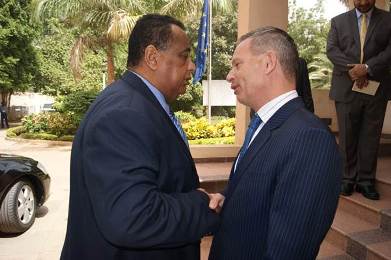EU reiterates its support to Sudan’s national dialogue
May 21, 2015 (KHARTOUM) – European Union (EU) representative in Sudan Thursday dismissed claims that they are hostile to the Sudanese government and reiterated the support of the European body to the national dialogue in the east African country.

After the meeting, Quincy told reporters he ” re- confirmed the European Union’s position on the importance of an inclusive and comprehensive national dialogue to resolve the Sudanese problems”.
“Both the government and opposition have to put Sudan and its people on the first place. He added further delays on the process complicates the situation and threaten its credibility,” he added.
He was keen to underline EU support for Sudan’s territorial integrity, its rejection for violent regime change and support for peace and stability in Sudan.
The meeting took place following unconfirmed reports in Khartoum about meetings of the Sudanese opposition in Europe in the upcoming days.
National Congress Party (NCP) political secretary, Mustafa Osman Ismail earlier this month said the role of “foreign forces in the dialogue would be marginal” and called to halt interfering in the internal process.
“The extremists and those who portray the EU as hostile to Sudan refuse to accept frank and open dialogue about issues of common concerns,” said the EU ambassador to Sudan
He described them as few but they are quite loud.
The diplomat pointed to the EU concern on rising extremism in the region.
He warned against the increased fragility and radicalization in the region to which Sudan is not immune.
He further expressed his optimism that Sudan and European countries can do better and work together for a prosperous region free from radicalization.
The national dialogue was launched by president Omer al-Bashir in January 2014. The inclusive and internal process aims to end war and reach a national agreement on democratic reforms .
The warring parties failed to sign a cessation of hostilities agreement in talks brokered by African Union organized in November December 2014.
Also, Sudanese government refused to participate in a pre-dialogue meeting before the electoral process, as the opposition and rebel groups propose to seek a new process instead of NCP proposed conference.
(ST)
